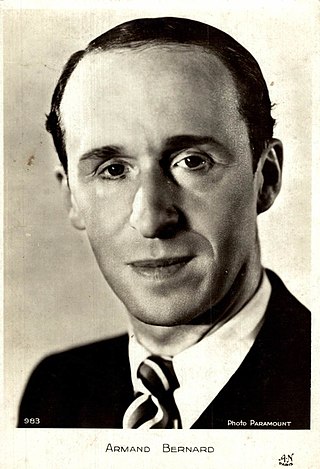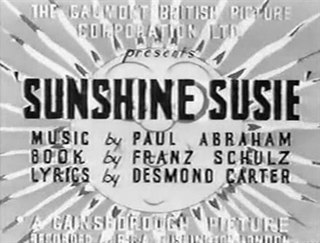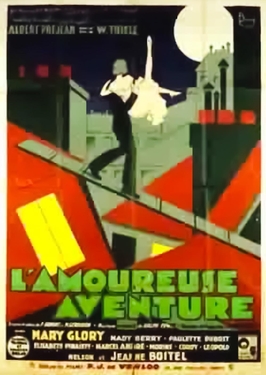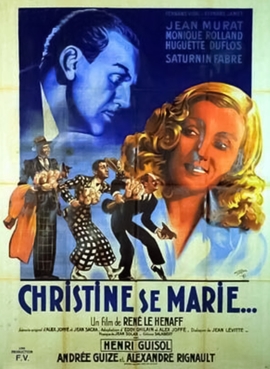The Lady of the Camellias, sometimes called Camille in English, is a novel by Alexandre Dumas fils. First published in 1848 and subsequently adapted by Dumas for the stage, the play premiered at the Théâtre du Vaudeville in Paris, France, on February 2, 1852. It was an instant success. Shortly thereafter, Italian composer Giuseppe Verdi set about putting the story to music in the 1853 opera La traviata, with female protagonist Marguerite Gautier renamed Violetta Valéry.

Marie Glory was a French actress.
René Lefèvre was a French actor and writer. Throughout his career, he worked with several notable directors, like Jean Renoir, Jean-Pierre Melville, Jules Dassin, and René Clair.

Armand Bernard was a French comic actor and composer known mainly for his prolific work in film.

André Birabeau was a French novelist, playwright and screenwriter.

Sunshine Susie is a 1931 British musical comedy film directed by Victor Saville and starring Renate Müller, Jack Hulbert, and Owen Nares. The film was shot at Islington Studios with sets designed by Alex Vetchinsky. It was based on a novel by István Szomaházy. An alternate German-language version The Private Secretary was made, also starring Renate Müller.

The Private Secretary is a 1931 German musical film directed by Wilhelm Thiele and starring Renate Müller, Hermann Thimig and Felix Bressart.

The Private Secretary is a 1931 Italian "white-telephones" musical film directed by Goffredo Alessandrini and starring Elsa Merlini, Nino Besozzi and Sergio Tofano. It was the Italian-language version of the German film Die Privatsekretärin.
Wilhelm Thiele, also William Thiele (1890–1975) was an Austrian screenwriter and film director. He directed over 40 films between 1921 and 1960.

Le Miracle des loups is a French historical drama film from 1924, directed by Raymond Bernard, written by André-Paul Antoine, starring Jean-Emile Vanni-Marcoux. The scenario was based on a novel of Henry Dupuis-Mazuel "Le miracle des loups", published in 1924.
Jean Murat was a French actor. He was married to the French actress Annabella. He was one of the surviving passengers of the August 1923 Air Union Farman Goliath crash.
Marcel Gerbidon (1868–1933) was a French playwright and screenwriter. He collaborated frequently with Paul Armont. A number of his plays have been adapted into films such as the 1958 film School for Coquettes.

Paul Armont (1874–1943) was a Russian-born French playwright and screenwriter. He also collaborated with the Swiss writer Marcel Gerbidon. He was born Dimitri Petrococchino in Rostov in the Russian Empire.

Amourous Adventure is a 1932 French romantic comedy film directed by Wilhelm Thiele and starring Albert Préjean and Marie Glory. It was a French language version of the 1932 German film Madame Makes Her Exit which was also directed by Thiele and starred Liane Haid and Hans Brausewetter. It was shot at the Epinay Studios of Tobis Film outside Paris.

Gisèle Casadesus was a French actress, who appeared in numerous theatre and film productions. She was an honorary member of the Sociétaires of the Comédie-Française, Grand Officer of the Legion of Honor, Officer of the Ordre des Arts et des Lettres, and Grand-Croix of the National Order of Merit. In a career spanning more than 80 years, Casadesus appeared in more than a dozen films after turning 90.

The Fatted Calf is a 1939 French comedy film directed by Serge de Poligny and starring Elvire Popesco, André Lefaur and Armand Bernard. It is based on a play by Bernard Zimmer. The film's sets were designed by Jacques Colombier and Robert Gys.

The Théâtre Édouard VII, also called théâtre Édouard VII – Sacha Guitry, is located in Paris between the Madeleine and the Palais Garnier in the 9th arrondissement. The square, in which there is a statue of King Edward VII, was opened in 1911. The theatre itself, which was originally a cinema, was named in the honour of Edward VII, as he was nicknamed the "most Parisian of all Kings", appreciative of French culture. In the early to mid 1900s, under the direction of Sacha Guitry, the theatre became a symbol of anglo-franco friendship, where French people could discover and enjoy Anglo Saxon works.

The Typist Gets Married is a 1934 French-German comedy film directed by Joe May and René Pujol and starring Marie Glory, Jean Murat and Armand Bernard. It was a sequel to the 1931 film The Typist which also starred Glory.
The Ideal Woman is a 1934 French comedy film directed by André Berthomieu and starring René Lefèvre, Marie Glory and Arlette Marchal. It is based on the novel La Meilleure Maîtresse by Georges Oudard. The film's sets were designed by the art director Jean d'Eaubonne.

Christine Gets Married is a 1946 French comedy film directed by René Le Hénaff and starring Monique Rolland, Jean Murat and Huguette Duflos. The film's sets were designed by the art director Jacques Colombier.














